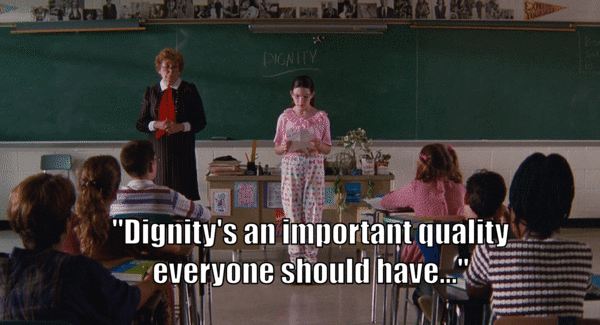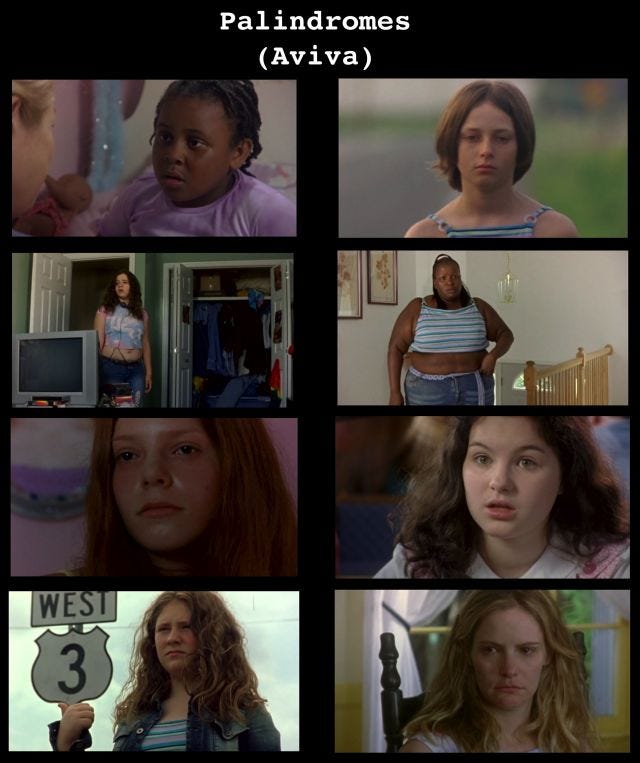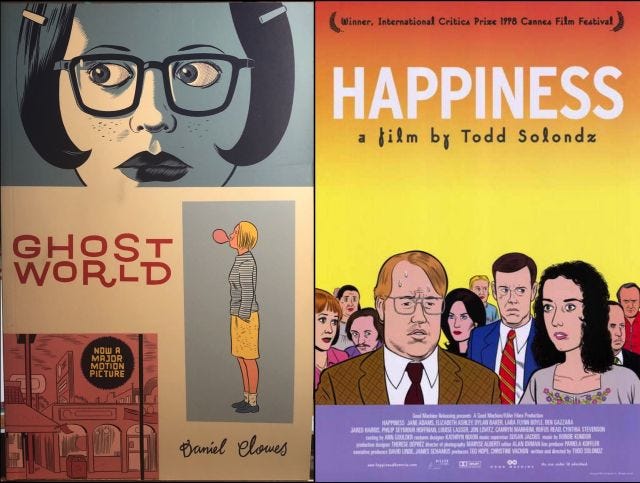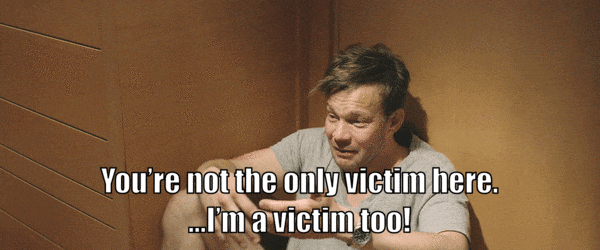Dark Horse
Written and Directed by Todd Solondz
1 hr 26 mins
2012
Todd Solondz has, as of this write-up, directed eight feature films, all of which have original screenplays by him and him alone. Dark Horse is the seventh title in that filmography and Solondz has called it "the saddest of all my comedies," which is itself really saying something as Solondz's specialty has always been suggesting comedy within tragedy... "and vice versa."
Solondz quickly gained a reputation through his first few films, tackling 'uncomfortable' subjects such as child molestation, rape, murder, abortion, abuse... - never casting a hero ("I don't find being judgmental very interesting," he has said) - and yet, somehow, in the face of such sordid material, still being... maybe funny? And it is for this reason critics have regularly referred to Solondz's work as 'bleak satire' or as 'comedies' that were 'deep black' or 'pitch black'... Dark Horse, in a way, was a response to this reputation:
**(Dark Horse, of course, did not ultimately wind up with that 'family-friendly' rating.)
Solondz has pitched his Dark Horse as "the tragic counterlife to George Costanza in Seinfeld"...
"That's the kind of comfortable, funny, amusing sit-com," Solondz has said, "here’s the tragic version." And it is really worth appreciating/stressing how difficult the tragicomic needle Solondz chooses to thread is - yes, here in Dark Horse, but also in practically every other film he's made (the 'practically' will soon be clarified)... And so it will be through highlighting the consistent aesthetics of Solondz's filmography wholesale (a body of work with an unexpected, unconventional interconnectedness) that this write-up will manage a description of many salient Dark Horse elements...
Solondz's films are not raunchy dramadies (sorry fans of Very Bad Things) and they are entirely free of mawkish sentimentalism - and while Solondz avoids providing even a phantom comfort of 'everything will be okay one day,' his films are also not callus exercises in suburban despair (sorry fans of Your Friends and Neighbors)...
Solondz has described his films as "a test of the limitations of our sympathies. To what extant can we recognize the human in others" - and the effect Solondz's films have on me is that I am held in a perpetual, precarious state of constant pleasure and constant pathos, like a friendly breed of Cenobite for the brain...
Following my laughter will be a serious pang of sadness, causing me to rethink my laugh (inappropriately timed?)... and it is while hashing that thought out that the next smile starts to form. But viewers can't be 'logic-ed' into things like 'laughter' and the resonance of 'tragedy' - Solondz is well aware of this, having said many times:
My movies aren't for everyone, especially people who like them.
He's not being combative. He sincerely understands. (When introducing Dark Horse, he said to the audience, "If you are inclined to laugh, that's cool, and if not that's also cool.") Solondz (who, when not writing and directing, teaches film classes in NYC) has said of his filmography, "Every movie makes half the amount of the previous one. It's very smooth, the graph of my career." And, honestly, he doesn't appear to be exaggerating much...
(^^From Julian Murphet's Todd Solondz)
"…I hope you’re laughing…" he says about his steady 'box office' decline. Solondz has regularly been taken to task over his films' 'immorality' (they have been called "morally repugnant")... but "As everyone knows," Solondz has said, "in Hollywood the only thing that's morally repugnant is losing money." Worth noting of the above graph is the absence of Solondz's first feature, Fear, Anxiety & Depression - the reason for this omission may be due to how much of an outlier that film is in the oeuvre - Solondz has called it "terrible," openly regretting the end product, saying he lacked creative control over it... and indeed with its Woody Allen-esque humor and quirky staging, it does play as if made by an artist with fundamentally different sensibilities... It wasn't until his second feature, Welcome to the Dollhouse, that Solondz cemented his defining aesthetic...
Welcome to the Dollhouse earned Solondz a lot of positive attention at the 1996 Sundance Film Festival, and that attention kind of informed what he did next:
What he wrote was Happiness - a film that fared well critically at Cannes, but that Sundance flat-out rejected and its distributor, October Films (the company, worth noting, who bungled the release of the previous Spotlit Last Seduction), wound up dropping from release entirely. "There was apparently something that was inherently just too troubling for them that no cuts would alleviate," Solondz said. Indeed, Universal (October Film's parent company) seemingly shunned Happiness "solely because of its content" causing Good Machine (the company that produced Happiness) to buy the film back and release it themselves - and as a result of all this, Solondz's next project, Storytelling, involved a direct, definite meta-textual slant...
(^^That's Paul Giamatti, portraying a filmmaker with a noticeably similar look to Solondz himself.)
Storytelling found 'controversy' as well through a sex scene so 'outside the pale' it got the film slapped with an NC-17 rating from the MPAA, who is notoriously more sensitive about sex than it is violence, as well as more sensitive about male nudity than female nudity as well as more sensitive about female pleasure than male... [to reiterate a (self-evident) statement from the last write-up: the MPAA is in dire need of revision]... There is a documentary called This Film Is Not Yet Rated which details (as best it can) the MPAA's surreptitious and arbitrary rating system... The doc references Storytelling's 'problematic' scene, pointing out, with delight, how many thrusts it contains...
But the reason this scene remains famous within conversations about 'the ratings board' is due to how sly, wry Solondz successfully altered it to get Storytelling its desired 'R' rating without, in fact, cutting anything out... Solondz, actually, added something in... A big red box...
And that is how the scene played theatrically in the US, the enormous red box appearing on screen at the precise moment of 'penetration.' "I'm the author of the only studio movie ever to be released with a big red box in it," Solondz has said. "I take pride in that! [...] I actually felt bad for the Europeans because they didn't get to see the version with the red box." [Viewers will find a similar (though not sexual) moment of Solondz mocking 'censorship' in Dark Horse...]
The female figure seen in the above gif, by the way, is the great Selma Blair - and viewers will also find her playing one of the central figures in Dark Horse (that's her in this write-up's header photo, face down on the bed) - and though not a 'sequel,' Dark Horse actually has Blair portraying the same Storytelling character, just called by a different name... And that sort of fluid character connection is another pronounced Solondz trait. His film Palindromes (which is what follows Storytelling in the filmography) revisits certain Welcome to the Dollhouse characters but, more importantly, is structured, in part, around a main character who, over the course of the film, is played by eight actors of varying ages, races and genders...
As Dean Defino writes of this practice, "Audiences are capable of bridging such perceptual gaps, of creating unity from the inherently illogical..." And Solondz's next film, Life During Wartime (a title in The Criterion Collection), goes a step further: it is a sequel to Happiness... except with all the original actors recast...
[Interesting to note how critic Matt Zoller Seitz rescinded his negative review of Happiness after seeing (and loving) Life During Wartime.] Solondz's most recent film, Wiener-Dog enjoys recasting (and resurrecting!) earlier characters as well...
On paper this might all sound like the work of some sort of provocateur - but the truth is, with Solondz, these films really do not play as 'experimental cinematic endeavors' nor do the 'uncomfortable' and 'awkward' topics play as deliberately incendiary. Solondz presents everything in a straightforward manner and sets his stories within orderly, sanitized worlds. "Taking things out of the images to bring the people forward," as his cinematographer Ed Lachman has said. This strategy can be gleaned from even Solondz's screenplays, which decidedly lack scene description...
The way Solondz's scenes end up looking, in part, leans into the world of sitcoms and soap operas, where everything is kept in its proper place...
In Solondz's words, "The movies that I've made are a reflection of a sensibility. It's all with a kind of artifice." Sit-com worlds indeed possess an unsettling polish audiences happily accept - and it is in this way that, say, on Bewitched, Dick York could be replaced by Dick Sargent (as indeed he was at the top of season six) and the show's reality isn't completely 'disturbed'...
...or, at least, not anymore 'disturbed' than it already was (Solondz has called The Brady Bunch 'deranged' and The Wonder Years 'pure fantasy')...
So, Solondz's films, in sharing a certain cadence (blunt presentation of taboo subjects) and a certain worldview ('misanthropic,' some have said) and developing some strange cinematic universe of faults-baring characters (the SCU??) sharing even a certain geographic area (Solondz is a New Jersey-ian and his films revolve around that state) -
- would all seem to put Solondz at risk of eventually looking/sounding derivative/reductive/like an 'imitation' of himself (which has been known to happen with certain distinctive artists)... and yet he has somehow successfully avoided that trap with every one of his cinematic outings, instead freshly arriving at his chosen aesthetic each time in an unautomated, unrepetative way. Even being 'content to recast' has never felt like 'Solondz shtick.' Part of why this is may lie in how Solondz has constantly explored new narrative structures [Happiness, with its multiple-storylines, is Short Cuts-esque - Storytelling is divided into two sections (fiction and nonfiction) - Wiener-Dog is comprised of vignettes and, despite being under 90-minutes long, plays with an intermission]...
Point is: Solondz is always having fun - (and Dark Horse is no exception here, having too its own unique structural turn for viewers to discover)... And while there would definitely be some overlap in the venn diagram of Solondz's work with perhaps something like early-period Alexander Payne (thinking Election / Citizen Ruth era) as well as Terry Zwigoff (between whom there is already the connective tissue of Daniel Clowes, whose graphic novel Ghost World Zwigoff conquered on film and whose artwork was enlisted for Happiness' poster)...
- or mayhaps Ruben Ostlund winds up in Solondz's shade during parts of Force Majeure -
- it is Solondz alone who has so steadily conjured that miracle potion of emotion - that combinatory presence of pathos and comedy in equal enormity - not just over one film, but over (practically) every project of his decades-long career. And, at this point, Solondz has demonstrated that achieving that tonal balance is not 'lightning in a bottle' for him (his results have proven far too reliable)... yet it's also not a repeatable science, as it remains, it seems, a tone impossible for someone else to forge/imitate... it really seems, for Solondz, a natural expression. Observing retched human behavior with an eye of... mercy?... Allowing the wholesome to be completely defiled while the disgraced are given another chance... It's not the taboo topics that are funny - the rape or racism or child molestation isn't what gets the laugh - it never ever is - the humor would be suggested through the human behavior around those actions. It's the 'ugly' world, not the ugly act, that stands a chance at 'comedy.' Here is what Solondz tells his actors:
As mentioned at the start of this write-up, Solondz has called Dark Horse "the saddest of all my comedies"... funnily that is also exactly what he felt the need to say about Palindromes when that came out...
To see this (and more) in action, well, just watch Dark Horse...
For options on how to stream/rent Dark Horse, click here.
If Interested in viewing Solondz's other work (because some of it tricky to find) know that:
Fear, Anxiety & Depression currently exists online only as a VHS rip that has been uploaded to YouTube
Welcome to the Dollhouse’s viewing options may be found by clicking here.
Happiness is currently unavailable to stream in any fashion, so **drop a request in the form of an email reply to this essay and a direct link for streaming/download will be provided**
Storytelling’s viewing options may be found by clicking here.
Palindromes is currently unavailable to stream in any fashion, so **drop a request in the form of an email reply to this essay and a direct link for streaming/download will be provided**
Life During Wartime’s viewing options may be found by clicking here.
Wiener-Dog’s viewing options may be found by clicking here.
And finally...
A far less harked on commonality between all of Solondz's films is his attention to music. Every single one of his films to-date (including that marginalized, self-maligned first feature) contains original music - yes, all the films roll their end credits to Original Songs - a couple of which are not readily available... but fear not...
Fear, Anxiety & Depression [Mark Klingman wrote the music and Solondz himself provides the vocals]
Happiness [Michael Stipe sings Eytan Mirsky's song]
Storytelling [Belle and Sebastian wrote the music (Storytelling became, in fact, an album of theirs) and it's worth noting how the band turned down composing music for Shrek at this same time (2001) - Stereogram wrote, "You have to love the idea that someone, anyone, was ever willing to say yes to Todd Solondz and no to Shrek."]
Palindromes [Eytan Mirsky returned to write with Curtis Moore and Matthew Brookshire]
Life During Wartime [Devendra Banhart sings Todd Solondz’s lyrics to Marc Shaiman's music]
Wiener-Dog [Eric William Morris performs another Marc Shaiman song]
And indeed Dark Horse too had multiple songs written for it that are (in my opinion) perfectly composed and hysterically placed - and if interested in having an audio file of Michael Kisur's song heard over Dark Horse's credits, simply send a request in the form of a reply to this letter (after seeing the film!) and a direct link for streaming/download will be provided...
Meryl Anady is on Twitter here.
[This essay was originally sent to subscribers on March 04, 2021]
![Spotlight on [Cinema]](https://substackcdn.com/image/fetch/$s_!NN_D!,w_80,h_80,c_fill,f_auto,q_auto:good,fl_progressive:steep,g_auto/https%3A%2F%2Fbucketeer-e05bbc84-baa3-437e-9518-adb32be77984.s3.amazonaws.com%2Fpublic%2Fimages%2F78417b1a-402f-4c53-8502-eb81a87cde85_346x346.png)

![Spotlight on [Cinema]](https://substackcdn.com/image/fetch/$s_!NN_D!,w_36,h_36,c_fill,f_auto,q_auto:good,fl_progressive:steep,g_auto/https%3A%2F%2Fbucketeer-e05bbc84-baa3-437e-9518-adb32be77984.s3.amazonaws.com%2Fpublic%2Fimages%2F78417b1a-402f-4c53-8502-eb81a87cde85_346x346.png)




















